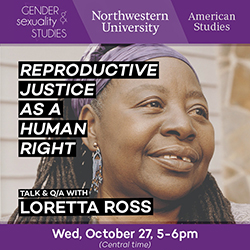Activist and Prof. Loretta Ross speaks about reproductive justice

Courtesy of Northwestern University
Activist and professor Loretta Ross spoke Wednesday over Zoom about reproductive justice, a term she coined in 1994.
October 28, 2021
Content warning: This story contains mention of sexual assault.
Northwestern’s Gender & Sexuality Studies Program hosted reproductive justice activist Loretta Ross Wednesday as part of a quarterly series focusing on Black feminist theory and practice in reproductive justice.
Ross joined the women’s movement in 1978, working at the first rape crisis center in the country. In 1994 she helped define the term “reproductive justice,” and later founded the National Center for Human Rights Education and co-founded SisterSong, two organizations advocating for reproductive justice. Now a professor at Smith College, Ross has co-authored three books, with a fourth set for release this year.
“We want to bring in speakers who are theorizing what a different future might look like, how to move from here to there and doing the work of organizing to build that alternative future,” event organizer and Gender & Sexuality Studies Prof. Amy Partridge said.
Ross opened the event by speaking about her personal experiences. At 15, she gave birth to a baby conceived through incestual rape, and she became pregnant again a year later. She received an abortion, but at 23 years old she learned she could not have another biological child due to a defective IUD.
While at college, Ross said a member of the Black Panther Party introduced her to the DC Rape Crisis Center. Previously, Ross said she “did not have the words” to explain what had happened to her. The conversations she had there about consent and bodily autonomy led her to change her career path.
“I am always that scared 14-year-old teenager, even though I’m 70 years old now.” Ross said. “I didn’t know what my cousin was doing to me was wrong. I didn’t know how to give consent … I decided: I’m going to dedicate my life to making sure to stop other girls from going through that with every ounce of my heart.”
In June 1994, at a conference hosted by the Illinois Pro-Choice Alliance, Ross was asked to support healthcare reform drafted in large part by then-first lady Hillary Clinton. Clinton had eliminated reproductive healthcare from the proposal to gain Republican support.
Then a representative for the Center for Democratic Renewal, Ross did not want to support the bill and met with the twelve other Black women at the conference to tackle the question: “What do we need from healthcare reform?”
Two months later, the group took out a two-page advertisement in the Washington Post, and under the banner “Black Women for Healthcare Reform,” defined its answer: reproductive justice.
“This theory was created by Black women because we fight for the right to have the children that we want to have because we’re always subjected to strategies of population control,” Ross said. “Our roots and our children are blamed for everything from the environmental crisis to the mortgage crisis to crime to bad schools.”
In her talk, Ross defined the original core tenets of reproductive justice: the human right to choose to have children, to refuse to have children and to decide where and how to raise children.
Ross said the term reproductive justice was defined by a new set of activists about 10 years later. It now includes the right to self and sexual pleasure, the freedom to express one’s own gender, access to healthcare and body positivity. It also emphasizes intersectionality.
SESP freshman Meena Sharma, who attended the talk, said she felt Ross’ points about intersectionality were the most impactful parts of her talk.
“We don’t often hear intersectionality referenced as a state, rather than an identity,” Sharma said. “I like how she described intersectionality as an action, rather than a definition.”
Intersectionality is one of two criteria Ross said are essential for practitioners of reproductive justice.
“You use intersectionality to determine what your vulnerabilities are,” Ross said. “Those need to be attended to so you can have the same human rights as people without that vulnerability. If you’ve got to use reproductive justice, it must be intersectional, and it must be based on a human rights framework.”
Email: AvaniKalra2025@u.northwestern.edu
Twitter: @avanidkalra
Related Stories:
— Gender and Sexuality Studies Program celebrates 45th anniversary
— Professors discuss Black and White feminism at anti-racism speaker series


